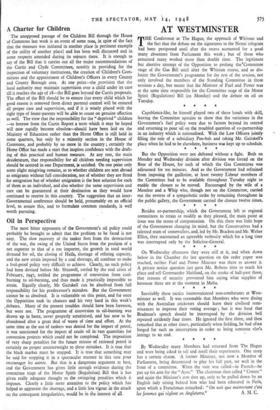A Charter for Children
The unopposed passage of the Children Bill through the House of Commons last week is an.event of some note, in spite of the fact that the measure was initiated in another place (a pertinent example of the utility of another place) and has been well discussed and in some respects amended during its sojourn there. It is enough to say of the Bill that it carries out all the major recommendations of the Curtis and Clyde Committees, notably in providing for the inspection of voluntary institutions, the creation of Children's Com- mittees and the appointment of Children's Officers in every County and County Borough area. At one point—the .provision that the local authority may maintain supervision over a child under its care till it reaches the age of 18—the Bill goes beyond the Curtis proposals. The effect of the Bill should be to ensure that every child which for good reason is removed from direct parental control will be ensured all proper care and supervision, and if it is wisely placed with the right type of foster-parents will be able to count on genuine affection as well. The view that the responsibility for the "deprived" children —to borrow from the Curtis Report a term which it may be hoped will now rapidly become obsolete—should have been laid on the Ministry of Education rather than the Home Office is still held in some quarters, but only by a minority section in the House of Commons, and probably by no more in the country ; certainly the Home Office has made a start that inspires confidence with the draft- ing of this practical and human measure. At any rate, the main desideratum, that responsibility for all children needing supervision should be centred in one Department, is satisfied. On one point only some slight misgiving remains, as to whether children are sent abroad as emigrants without full consideration, not of whether they are fitted for emigration but of whether emigration is the best solution for each of them as an individual, and also whether the same supervision and care can be guaranteed at their destination as they would have continued to receive in this country. The suggestion that an inter- Governmental conference should be held, presumably on an official level, to assure this, and to formulate common standards, is well worth pursuing.






























 Previous page
Previous page